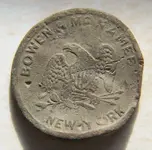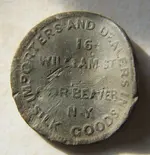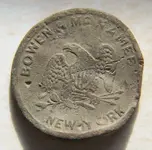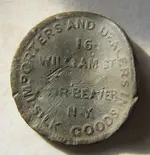In 1885 The company waS DRY GOODS. American and Foreign Silks. BOWEN, McNAMEE CO. (Imp. Job.) 112 Broadway.
Among the jobbers
Bowen & McNamee attracted attention about 1850 by erecting a
marble building on Broadway between Cedar and Pine Streets. And
mention may be made of the fact that 1850 was the year when the
up-town movement in business became the most perceptible. For more
than half a century Broadway had existed as a residential street rather
than a commercial thoroughfare. But the time now arrived when
several blocks of old dwellings were demolished for the purpose of
giving room for business houses.
When several local businesses denounced the New York firm of Bowen and McNamee for failing to support the fugitive slave law in 1850, Henry Chandler Bowen replied in the papers that “we wish it distinctly understood that our goods, and not our principles, are on the market.” The threads of idealism and materialism formed the fabric of Henry Bowen’s life, but only rarely could they be disentangled as neatly as Bowen’s announcement suggested.
Bowen set out from his native Woodstock, Connecticut, in 1834 at the age of twenty-one. Armed only with experience clerking in his father’s general store, he went to New York and found a job in the silk-wholesaling firm of Lewis Tappan, one of the major financiers of the emerging antislavery movement. Within the next dozen years Bowen had opened his own silk-wholesaling and dry goods company with Theodore McNamee and married Tappan’s daughter, Lucy Maria. He became the primary founder of an antislavery weekly journal called The Independent and of the Congregational Plymouth Church in Brooklyn. By 1846, his valise full of banknotes and his mind filled with reforms, he was able to return to Woodstock, with plans for a grand summer home. He called it Roseland, for the splendid rose gardens that would surround it.









